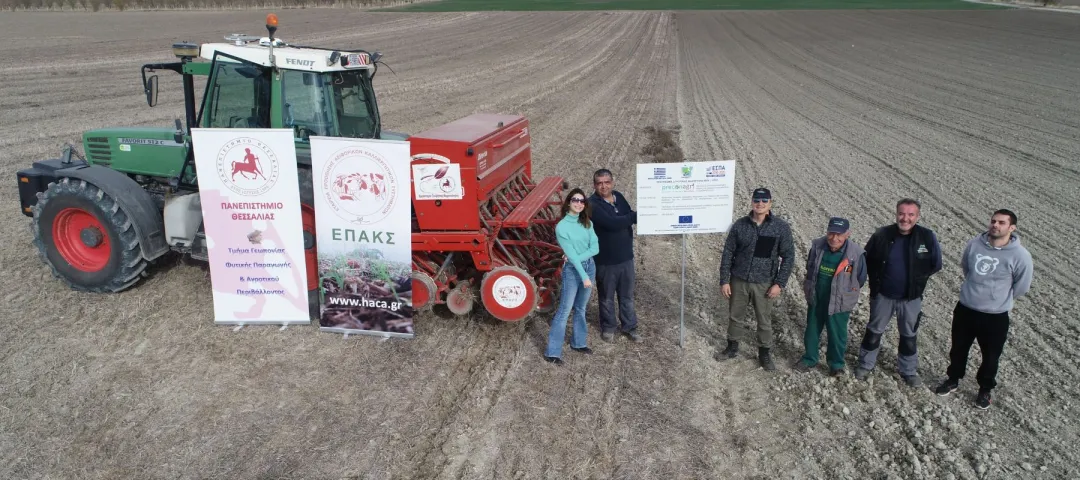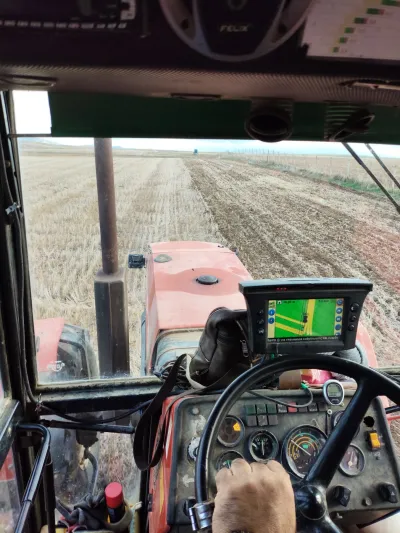Summary
The Operational Group PreConAgri (Precision, Conservation and Agriculture) promotes climate-smart agricultural practices to boost soil fertility and prevent erosion, helping farmers in Greece and beyond become more resilient to climate change.
Resources
Links
The effects of climate change are becoming increasingly apparent across Europe, with farmers bearing the brunt of these impacts. In regions such as Krokos in Kozani and Nikaia in Larissa in Greece, severe soil degradation exacerbates these challenges, threatening farm productivity and environmental sustainability. Addressing these pressing issues and enhancing sector resilience requires innovative, on-the-ground solutions. Since 2023, the Operational Group PreConAgri (Precision, Conservation and Agriculture) has been supporting climate-smart agricultural practices to boost soil fertility and prevent erosion, helping farmers in this region become more resilient to climate change. The active involvement of multiple stakeholders in the Operational Group, including farmers and researchers, enhances the practicality, scalability, and impact of the solutions developed, paving the way for the widespread adoption of sustainable practices.
The PreConAgri Operational Group integrates conservation and precision agriculture techniques to develop a cultivation model that improves the environmental impact of conventional farming practices. Myrto Kosti, the project coordinator, explains: “Through methods like conservation tillage, differential fertilisation strategies, and controlled machinery movement, we aim to increase soil carbon sequestration, improve soil quality, and enhance crop yields.” Pilot trials are being conducted in durum wheat fields in Greece, with final results expected in August 2025.
Conservation agriculture methods include minimal or no-tillage and maintaining permanent soil cover with vegetation and crop residues for mulching. Precision agriculture techniques involve Variable Rate Nutrient Application based on real-time sensing and actuation, as well as map-based actuation in plots using Machine Guidance for precise fertilisation. Controlled Traffic Farming optimises machinery paths within and around fields, minimising soil compaction and improving operational efficiency. By testing these practices in real production conditions, the project demonstrates their practical advantages and long-term sustainability for farmers. Concrete benefits include the reduction of fossil fuel use, prevention of erosion and enhancement of soil biodiversity.
The project is developing a cultivation model that is adaptable to various crops and regions, which means a higher potential for scalability and increased adoption of sustainable farming practices. Different crop rotation practices are tested, for example, by incorporating crops with varying root zone depths and utilising winter cereals, such as barley, to improve soil fertility.
Myrto concludes: “With the project outcomes, PreConAgri wants to strengthen the resilience and sustainability of agriculture in Greece and beyond.”
Background information
Between 5 May and 9 May 2025, three new cross-visits for Operational Groups will focus on water management, pollinators and animal welfare.
Find out more about EU CAP Network cross-visits for Operational Groups. These cross-visits foster in-depth, transnational exchanges of knowledge, by connecting EIP-AGRI Operational Groups from different Member States that are active in the same field of work.
Contact Information
Myrto Kosti


